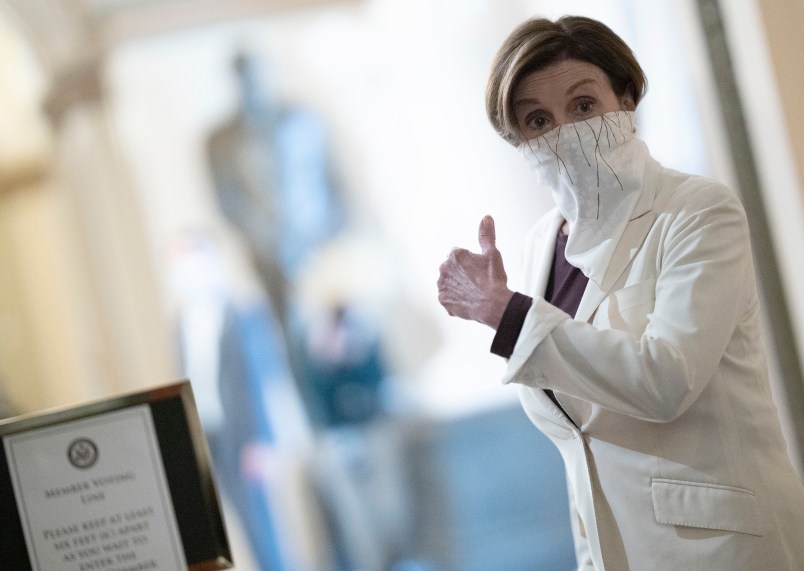This article is part of TPM Cafe, TPM’s home for opinion and news analysis.
Last week, members of the House gathered in Washington to cast their votes on the stopgap coronavirus relief funding bill. That move put them, their staff, the airline and airport employees with whom they interacted, and their families at greater risk of contracting the deadly coronavirus — all because Congress doesn’t have remote voting. The House was reportedly also supposed to decide whether to allow proxy voting, but following Republican objections, members decided to create a committee to study the problem instead. At the moment, there’s a cloud of uncertainty hanging over when or how Congress will vote next: plans to return to Washington next week were scuttled by House leadership, under the advice of the House physician.
With an economy in freefall and more people falling sick every day, it’s clear that our Congress must do much more to solve the worst crisis of our lifetimes. It is equally clear that neither congregating in Washington during a pandemic, nor passing significant legislation without debate, is in the long-term interest of our democracy. That’s why Congress must immediately pass temporary remote voting. There is no time to waste.
We are writing as former Hill staffers. We’ve stood on the House and Senate floor when important decisions were made, watched members deliberate over votes and exchange critical pieces of information. We’ve even seen more than a few members discreetly change their votes when they realized they had voted the wrong way.
A few weeks ago, 70 House Democrats sent a letter to leadership calling for remote voting. Last week, House leadership expressed support for some form of remote or proxy voting. Most people who hear about this debate probably think, why is this such a big deal? Do it already. It’s just a vote.
But it’s not just a vote. What happens on the floor is much more than that. It’s serious, reasoned and urgent discussion about important issues that members need to resolve before they vote on a bill. It’s persuasion as members convince one another of the power of a particular approach. And often, it’s education, as members ask their colleagues or staff for advice to help them vote the right way.
We know what happens on the floor is important. And yet, we believe the time has come for remote voting. In this time of pandemic, Congress should temporarily change the rules to allow for remote voting.
The House and Senate have critical work to do in the coming months. If they adjourn sooner, they risk leaving millions of Americans in the lurch. The full human cost of this pandemic, in lives lost, jobs lost, and industries decimated, won’t be known for quite some time.
We need Congress hard at work to repair the damage. But every time members convene in Washington, they put themselves at risk, their staff at risk, people they interact with in airports and taxis at risk, and the national security at risk. The floor is a frenzy of activity. Forget about six feet of social distance. The place is jam-packed, as are committee rooms, congressional offices, the hallways, and the elevators.
Already, the number of members of Congress who have either tested positive or entered into quarantine is closing in on 50. And staff have tested positive too. With 147 members of the House of Representatives and 48 members of the Senate over 65, Congress is clearly in the age group most vulnerable to falling seriously ill and dying from the novel coronavirus. We cannot let that happen. If Congress is taken down by the coronavirus en masse, we will have a national security crisis of epic proportions on our hands. And with elections in many states postponed for the near future, we won’t be able to replace them anytime soon.
We need Congress now more than ever to provide critically needed supplies, safety and health protections for our first responders, as well as economic relief to the millions of families who are now at risk of losing everything — their jobs, their homes, their futures — through no fault of their own. We need our Congress paying close attention as this crisis unfolds, and developing solutions at the scale of the problem.
The only way that Congress can safely do its job right now is by protecting itself. It’s time for Congress to lead by example and do what is being asked of many of us. Stay home. Work from home. Vote from home.
Liz Watson is Executive Director of the Congressional Progressive Caucus Center, and a former member of the professional staff for the U.S. House Education and Labor Committee.
Joe Cirincione is President of the Ploughshares Fund, and a former member of the professional staff for the U.S. House Committee on Armed Services and the Committee on Government Operations.
Leah Greenberg is Co-Executive Director of Indivisible, and a former member of the personal staff in the Office of U.S. Congressman Tom Perriello.






